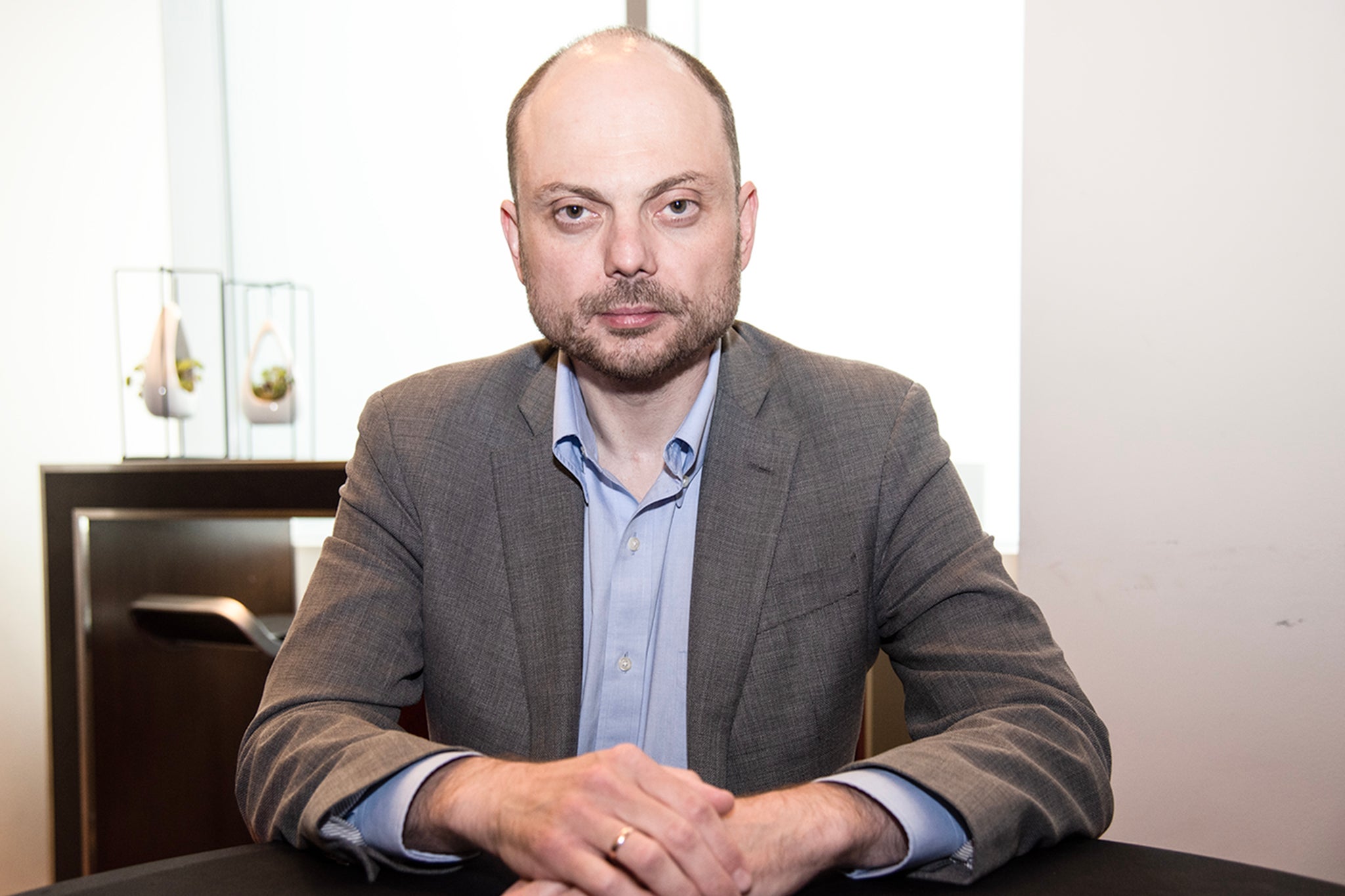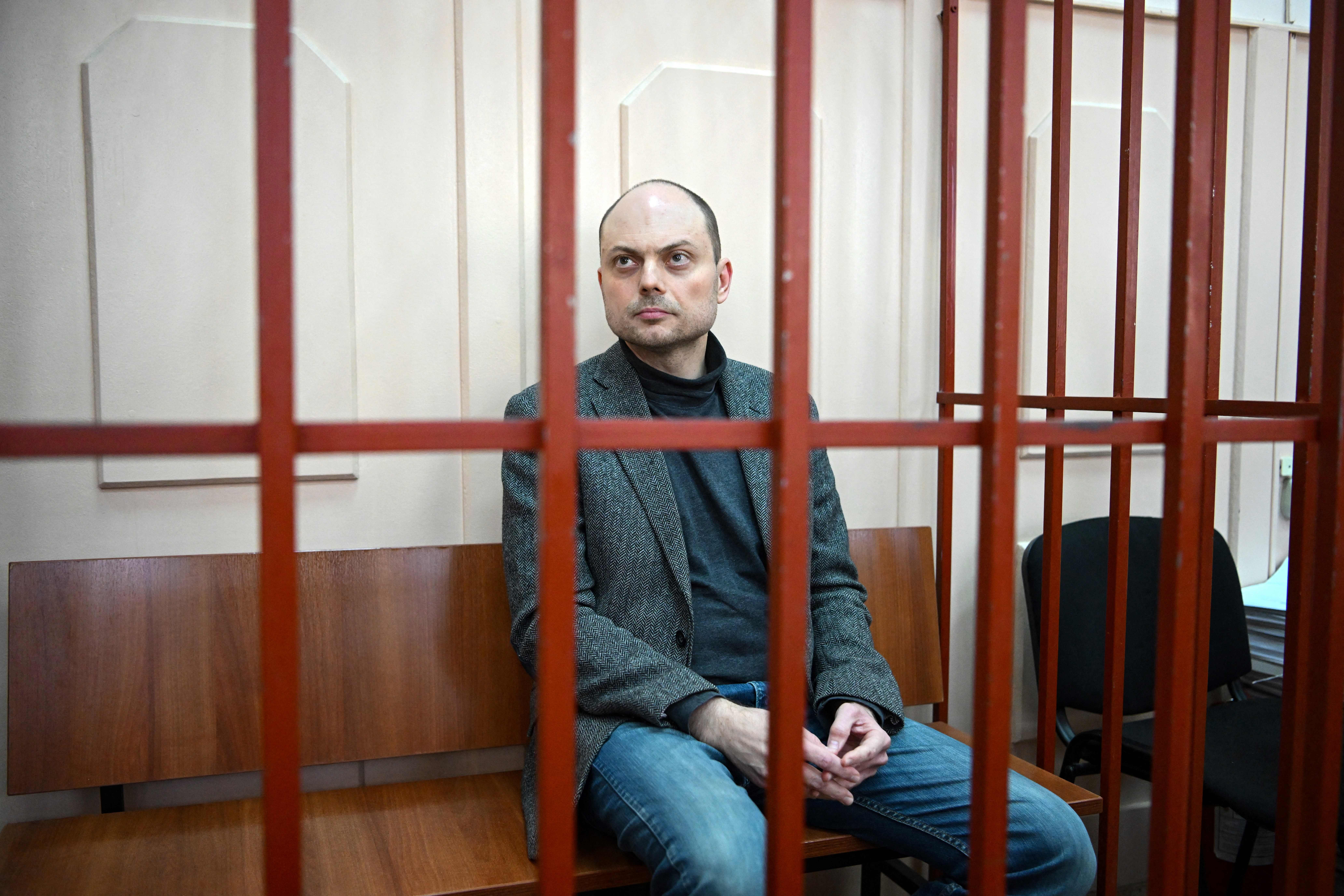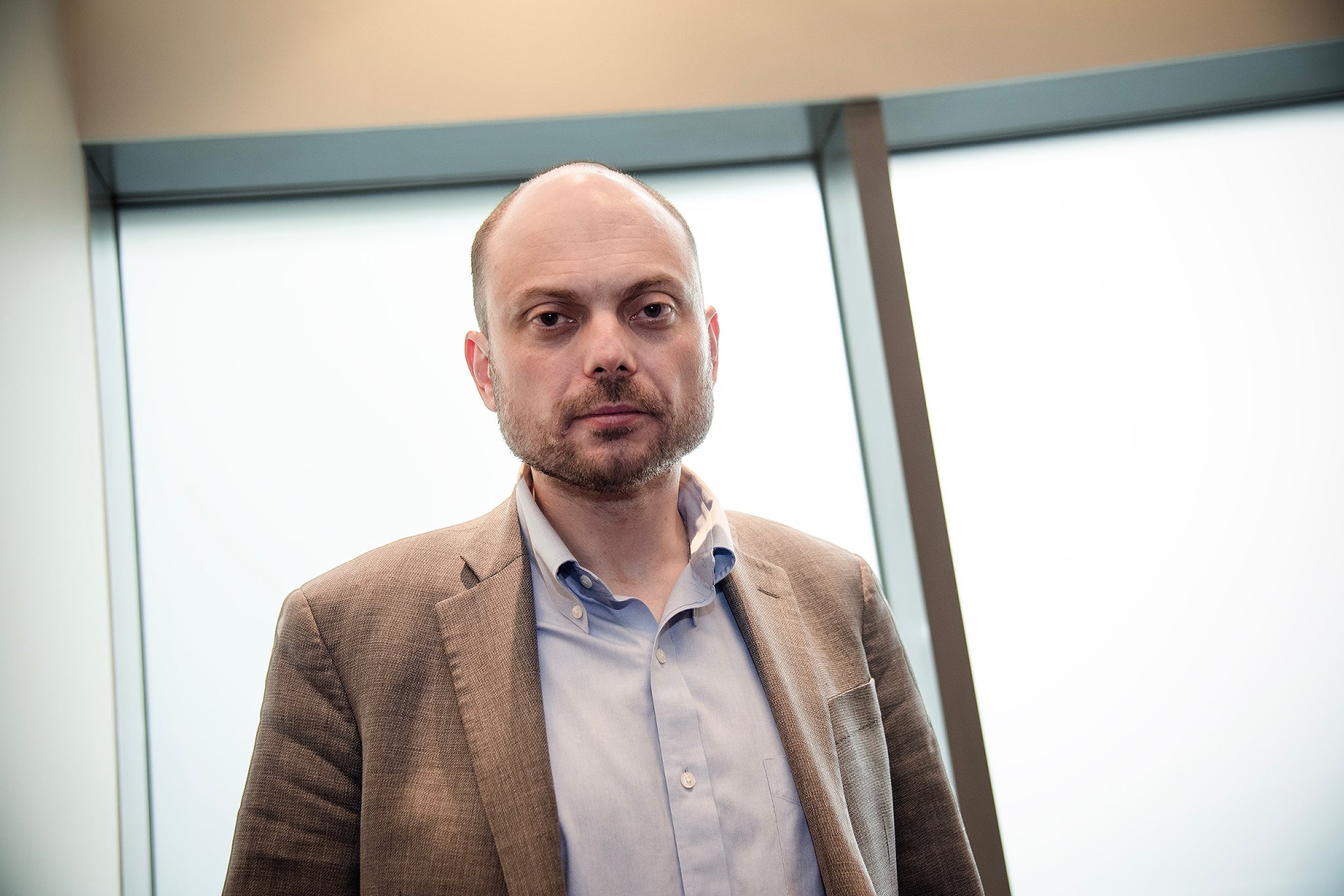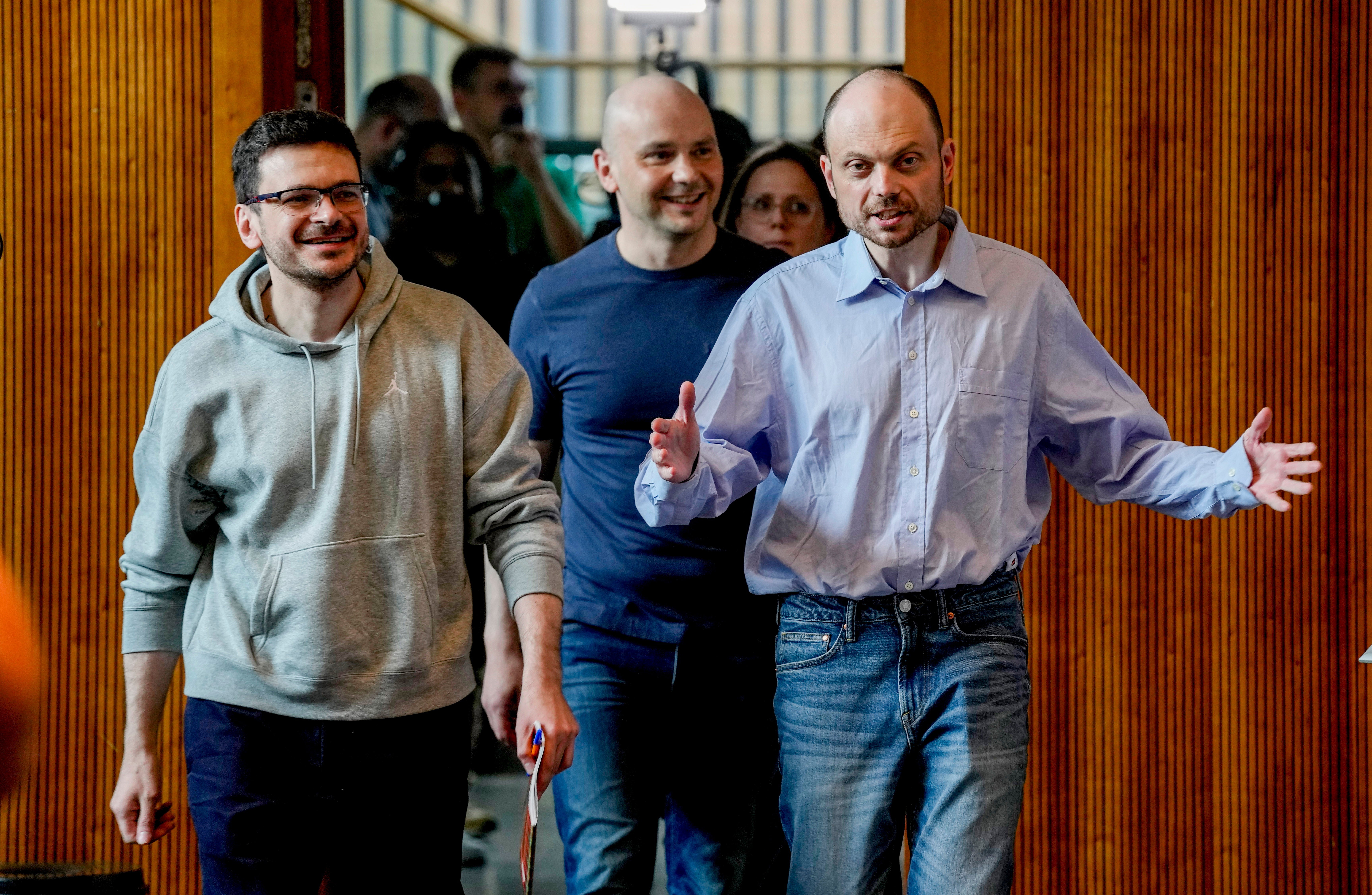Kremlin prisoner-swap exclusive: How I survived 11 months in Putin’s gulag
Vladimir Kara-Murza, one of the faces of Russian opposition to Putin alongside Evan Gershkovich, sits down with The Independent for the first time since being freed in a historic prisoner swap. Tom Watling reports


A British-Russian dissident and opponent of Vladimir Putin, freed in the most high-profile prison swap since the end of the Cold War, has described the brutal treatment he suffered during 11 months of solitary confinement in Siberia.
Vladimir Kara-Murza spent 23-and-a-half hours a day in a tiny cell as part of his 25-year sentence for speaking out against Russia’s war of aggression in Ukraine.
The 43-year-old, who served two-and-a-half years of his total sentence before being released in August, spoke of talking to walls and willing away the days “no longer understanding what’s real and what’s imaginary”.
In an exclusive interview with The Independent hours after touching down in Britain for the first time since the historic US-brokered prison deal with the Kremlin, the Cambridge-educated activist relived his horrifying experience in unflinching detail.
Kara-Murza said the exchange was not merely a swap but a “life-saving mission”. The death in prison in February of fellow dissident Alexei Navalny, which he described as a Kremlin-orchestrated murder, underscored the danger he was in.
“Mentally, psychologically, emotionally, just to be locked up in a cupboard day after day, week after week, month after month, without as much as saying hello to anybody, it’s really, really not easy,” he said at a hotel near the House of Commons.
“After about two or three weeks, your mind really starts playing tricks on you. You start forgetting words. You start forgetting names. You start speaking to walls. You stop understanding what’s real and what’s imaginary.”
Kara-Murza was arrested in Moscow in April 2022, two months after Putin launched his full-scale invasion of Ukraine, for giving speeches around the world about the war crimes Russia’s forces were committing against civilians.
His court hearing, which he compared to Stalin’s show trials during the dictator’s brutal reign, was a sham. He was sentenced to 25 years in a Siberian prison, the longest sentence handed down to a political prisoner since the fall of the Soviet Union.

It was not the first time Kara-Murza had been targeted by the Putin regime after the Kremlin allegedly tried to poison him first in 2015 and then again in 2017, prompting his wife Evgenia and their three young children to flee to the US.
On both occasions, the Russian opposition figure was comatose and nearly died. It left him with a debilitating nerve condition called polyneuropathy that affects his ability to feel his fingers and toes.
When a prison doctor in Moscow examined him during his pretrial detention, they said he needed constant fresh air, walks and medical treatment to stave off the worsening condition. They gave him three years to live, according to his lawyer Vadim Prokhorov.
But by April last year, he had been sentenced and sent to a prison in Omsk, Siberia. Within months, he was shoved into a tiny punishment cell. His only walk was for half an hour “in a circle over and over again” in an enclosed courtyard with bars overhead. During this time, his wife told The Independent he would die if he was not rescued from prison.
Kara-Murza was equally blunt on Thursday about his fate had he remained incarcerated. “No one can survive 25 years in a Russian gulag, especially after the two poisonings I’ve been through,” he said. “It was a death sentence.”
Talking about the prisoner swap – which also included Wall Street Journal reporter Evan Gershkovich, who was falsely accused of espionage and sentenced to 16 years imprisonment – Kara-Murza described it as “not an exchange but a life-saving operation”.
They were among 16 prisoners set free from Russia. The Kremlin received eight Russians in return, including FSB hitman Vadim Krasikov, convicted in Germany of murdering Chechen Zelimkhan Khangoshvili in 2019.
Despite the cruelty of his first months in solitary, Kara-Murza said his psychological torture got worse as his detention dragged on. Prison guards, his only contact with the outside world, punished him for minor infractions such as undoing his top button or taking his hat off while outside. They kept a record of his so-called unruliness.
In other instances, his prison handlers tricked him into breaking ridiculously stringent rules.

In his first Siberian prison, penal colony IK-6, he was punished one day for failing to get up at 6am, the time at which prisoners are required to start their day. But guards had turned off the alarm and prisoners were not allowed clocks in their rooms.
In January, Kara-Murza disappeared from IK-6 and reappeared days later in the nearby IK-7 penal colony – one of the most restrictive prisons in the country.
Authorities claimed at the time it was punishment for Kara-Murza’s “consistent violation of the rules of serving his sentence”.
Up to that point, he had already suffered reduced phone rights and prevented from speaking to the outside world. His last call with his family had been in December 2023, limited to 15 minutes. Forfeiting her chance to hear her husband’s voice, his wife gave each of their three children five minutes each. She used a stopwatch to make sure each child – the oldest just a teenager – got the same amount of time to speak to their father. He spoke to them on just three occasions in 2023.
When he was moved to IK-7, his phone rights were completely removed. Visibly angry, Kara-Murza, recalled the cruelty of that move, directed not only against him but his family.
“My family, my wife and my children, were made to suffer only because they bear the same name as me, only because they’re my family,” he said.
He did not speak to his wife or children again until the middle of July this year, by which time he had missed his daughter’s graduation day and his 20th wedding anniversary.

By this point, he was forced to wake up at 5am each day and push his bed up against the wall, where it would stay until 9pm when lights went out. They didn’t want the prisoners to be able to lie down, he said.
He was given 90 minutes a day with a pen and paper, when he could do court correspondence and write heavily censored letters to his lawyers and wife. The rest of the time, he read one of the two books he was allowed in his room at any one time.
He chose a Spanish language textbook – learning a language was a tip suggested by his idol, Soviet dissident Vladimir Bukovsky – or the Bible, which he described as vital to his survival.
He was also forced to confront the end date of his sentence every day. “Every time you had to write a request, for what you wanted with your tea, for example, you had to write your name, your cell number, and the date of the end of your sentence,” he said.
“In my case that was 21 April 2047. I will never forget that day. At some point, it started getting to me, writing and saying this date day after day.”
Then in mid-July, Kara-Murza disappeared again. The authorities said he had been moved to hospital; in fact, they transferred him to IK-11, an even stricter colony, removing his final right, his access to his lawyers.
“The hospital was only that by name,” he said. “When people hear the word ‘hospital’, they imagine beds, doctors walking around. No, it was nothing like that. It was actually the harshest prison I had been to, in all my two years and three months, which was some achievement.”
Kara-Murza described his survival after so much psychological torture as a “miracle”. His faith, his determination to learn Spanish, and his wife passionately fighting for his release were all that kept him from giving up.
Also his conviction that a peaceful Russia without Putin at the helm would one day emerge. All the time he was held in solitary confinement, deprived of human contact, he kept telling himself: “I know I am right.”
Join our commenting forum
Join thought-provoking conversations, follow other Independent readers and see their replies
Comments